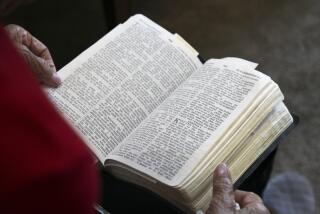New Translation of Jewish Holy Book Wins Wide Praise
- Share via
Until now, there has never been a modern English translation and commentary of the haftarah, the book of prophets that helps form the core of the Jewish identity.
Based on nearly 3,000-year-old teachings, and written 2,200 years ago after the Syrians banned the Jewish Bible, or Torah, the haftarah is read at weekly Sabbath services and forms the core of the bar and bat mitzvah ceremonies celebrating Jewish youths’ initiation to adulthood.
But the haftarah has remained incomprehensible to most American Jews. “The average Jew who goes to synagogue today to hear someone read the haftarah is totally at a loss,” said Rabbi W. Gunther Plaut of Holy Blossom Temple in Toronto. “The text is not understandable, so they listen to their neighbor talking.”
To remedy that, Plaut and New York Rabbi Chaim Stern have collaborated on a newly released modern translation of the holy book, “Haftarah Commentary.”
Published under the aegis of the Reform movement’s Union of American Hebrew Congregations, the 928-page “Haftarah Commentary” is likely to become standard reading in many congregations.
The Reform movement president, Rabbi Eric Yoffie, has lauded the gender-neutral book as radically different from other translations, while New York’s authoritative Jewish Week newspaper has characterized it as “revolutionary.”
The book consists of Stern’s translation of the Hebrew texts, followed by Plaut’s interpretations of what the texts mean. It also illustrates the haftarah’s 85 prophetic writings with references to a variety of historic figures and academic disciplines, from Shakespeare to Jonathan Swift to modern archeology.
Consulting editor David Sperling, a professor at Hebrew Union College in New York, said the commentary tries to capture and reflect how the ancients thought and perceived the world.
The scriptures themselves were “a significant attempt” by ancient prophets and writers “to make sense out of the world in which they lived. They looked at war and starvation, and wondered what it is about,” Sperling said.
Its ancient authors thought the world worked according to a moral scheme. “Thus, unrighteous behavior would lead to punishment, while righteous behavior would be rewarded in this life,” he said.
“In America today, we no longer have that same belief. But many of us are continuing the same search for meaning. We can’t necessarily accept the same answers. But [in the haftarah] we have a very useful guide, a sort of road map” to our ancestors’ ideals, he said.
Although intended principally as a text for the Reform movement, the “Haftarah Commentary” has gotten surprisingly good reviews in conservative quarters as well.
Rabbi Harold Schulweis of Encino’s Valley Beth Shalom, a Conservative Jewish synagogue, said the text is “especially timely in 1996,” when many Jews have strayed from and misinterpreted the teachings of the haftarah prophets.
Many modern Jews “have misunderstood the prophets as forecasters of the future.” Rather, he said, a prophet is “the conscience of Judaism, speaking to the people’s moral sensibilities. He is gifted with a religious audacity which enables him to challenge princes, kings and priests, and sees himself speaking in the name of God, or godliness.”
Schulweis said the reinterpretation of ancient teachings fits right in with mainstream Jewish tradition. “‘It’s why Judaism has been described as minimum text and maximum commentary,” he said. “This is what makes [the Torah and haftarah] living documents. No book can expect to be eternal and be the same.”
The repopularization of the haftarah is also important because it pledges contemporary rabbis to once more “follow the prophets, comforting the afflicted and afflicting the comfortable,” Schulweis said. It steers Jews away from “a mindless ritualism--people who go through the liturgical rites without understanding them.”
Among the commentary’s departures from tradition is the idea that the Jewish people are not supposed to have an exclusive convenant with God. Rather, it contends, Jews are supposed to be the agent for arranging a covenant between God and all humanity.
In a recent phone interview from his study at Temple Bet El in Chappaqua, Stern marveled “at the experience of trying to get into the mind of the text. English is a very different language, with a larger vocabulary but a different syntax [than Hebrew]. . . . So it becomes a high art getting into the minds of the people who actually were thinking these words.”
But the difficulties preparing the translation were more than just linguistic. Even in the present, he said, “the effort to understand oneself, let alone another person, is only partially successful at best. Through history and a different culture, it becomes even harder.”
Stern said he has been reading ancient texts for the past 60 years, since he was 5 years old. “I found remarkably great poetry in the [haftarah] texts,” he said. “It was a lot of fun reading and producing something of the same effect in a different language.”
More to Read
Sign up for Essential California
The most important California stories and recommendations in your inbox every morning.
You may occasionally receive promotional content from the Los Angeles Times.












